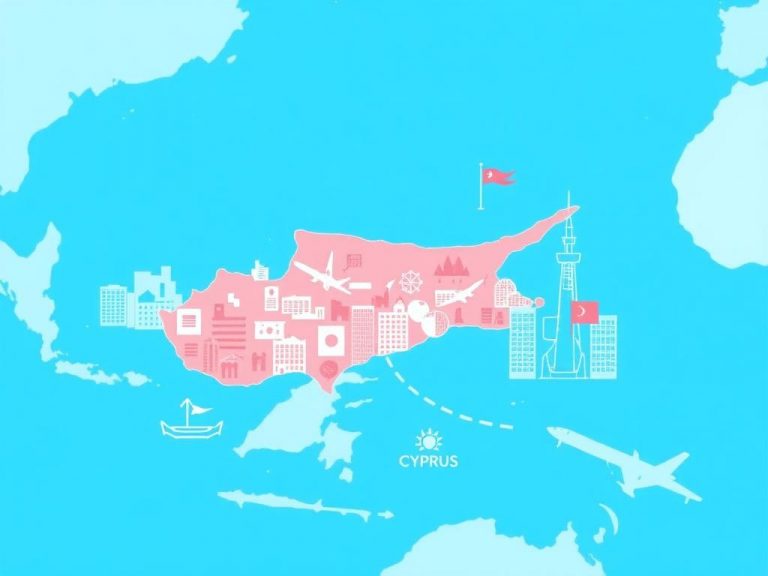Tourism’s Economic Impact on Cyprus: 2025 Industry Analysis
The island of Cyprus has long been heralded as a jewel in the Mediterranean for travelers seeking rich cultural history, sun-drenched beaches, and vibrant hospitality experiences. As 2025 unfolds, an in-depth analysis of the tourism sector’s economic footprint in Cyprus reveals significant developments that not only underscore the resilience of this industry but also its transformative role in the island’s economy. Understanding tourism’s economic impact on Cyprus requires a comprehensive look at multiple factors including tourism revenue Cyprus generates, the evolution of the hospitality industry Cyprus boasts, the patterns indicated by tourist arrivals Cyprus experiences annually, and the broader economic contribution Cyprus derives from these activities.
Historical Context and Current Landscape of Tourism in Cyprus
Tourism has been a critical pillar of Cyprus’s economy for decades. Historically, the island benefitted from its strategic location, forming a nexus between Europe, Asia, and Africa. This made it an appealing destination not only for leisure travelers but also for business tourists and expatriates. The 20th century saw steady growth driven by improved infrastructure and increased international accessibility, with tourism evolving into a primary economic driver. In recent years, Cyprus has experienced renewed attention due to strategic government initiatives aimed at enhancing its global tourism appeal.
In 2025, the hospitality industry Cyprus maintains continues to reflect gradual innovation and diversification. Coastal resorts cater to mass-market beach tourism while emerging boutique hotels and eco-tourism ventures respond to evolving traveler preferences. This dynamic landscape highlights Cyprus’s ability to balance traditional tourism models with sustainable growth strategies.
Tourism is not just a sector in Cyprus—it is a dynamic force that intertwines culture, economy, and community development.
Tourist Arrivals Cyprus Trends and Forecasts
The number of tourist arrivals Cyprus records each year serves as one of the most direct indicators of the industry’s health. In the early 2020s, the sector faced unprecedented challenges due to global travel restrictions and pandemic-related disruptions. However, as these restrictions eased, Cyprus witnessed a robust rebound. The 2024 fiscal year closed with a tourist arrivals Cyprus number approaching pre-pandemic levels, signaling a return of confidence among travelers.
In 2025, projections indicate further growth with expectations of 4.5 to 5 million visitors. This figure reflects not only leisure tourists but also business travelers and digital nomads who are increasingly choosing Cyprus as a destination. Several factors are driving this uptick, including increased airline connectivity, strategic marketing initiatives, and improved digital infrastructure supporting remote work.
Regional markets have evolved as well: Russia and the UK historically provided the bulk of tourist arrivals, but today, an influx from emerging markets such as China, India, and the Gulf states is noticeable. This diversification of visitor origin supports a more resilient tourism model that can better withstand geopolitical and economic shifts.
Diversifying tourist arrivals strengthens Cyprus’s market reach and reduces dependence on traditional source countries.
Tourism Revenue Cyprus Generates and Its Distribution
Tourism revenue Cyprus generates remains one of the most tangible measures of industry success and its impact on national income. For 2025, estimates place direct tourism revenue Cyprus secures at approximately €4.8 billion. This figure accounts for spending on accommodation, food and beverage, transportation, entertainment, cultural events, and retail, among others.
Economic gain from tourism in Cyprus is not evenly spread. Coastal regions, particularly Paphos, Limassol, and Ayia Napa, capture disproportionate shares of revenue due to concentrated resort development. Nevertheless, inland areas gaining recognition for heritage tourism and ecotourism contribute progressively as part of a strategic shift toward more balanced regional development.
The Greek Cypriot and Turkish Cypriot communities both benefit from tourism revenue, although disparities exist due to political and infrastructural divides. Cross-community tourism initiatives developed recently aim to enhance inclusivity and shared prosperity, which will be vital to future economic cohesion.
| Category | Estimated 2025 Revenue (€ billions) | Percentage of Total Tourism Revenue |
|---|---|---|
| Accommodation | 1.7 | 35% |
| Food and Beverage | 1.1 | 23% |
| Transportation | 0.6 | 12% |
| Entertainment and Activities | 0.7 | 15% |
| Retail and Miscellaneous | 0.7 | 15% |
Tourism revenue circulates through the economy in varied forms, magnifying its influence beyond mere visitor spending.
Hospitality Industry Cyprus: Structure and Innovations
The hospitality industry Cyprus represents is far more than hotels and restaurants; it encompasses a broad network of service providers, supply chains, and ancillary services such as travel agencies, event organizers, and cultural institutions. Over the last decade, the sector has witnessed significant modernization, integrating technology and sustainability into its core practices.
Technological adoption in booking systems, customer relationship management, and personalized travel experiences has raised the service quality and competitiveness of Cyprus’s hospitality. Meanwhile, sustainable tourism practices have become a priority; many hotels now pursue green certifications and implement water-saving and energy-efficient initiatives. This eco-conscious approach aligns with global trends and enhances Cyprus’s appeal to environmentally aware travelers.
Moreover, hospitality training programs in Cyprus have expanded, equipping the labor force with skills in multilingual communication, digital marketing, and experiential tourism. This investment in human capital strengthens the industry’s ability to adapt and thrive amid changing tourist expectations.
Modernization and sustainability efforts in Cyprus’s hospitality industry redefine its global competitiveness and market relevance.
Economic Contribution Cyprus Derives from Tourism Beyond Direct Revenue
While tourism revenue Cyprus directly earns is substantial, the overall economic contribution Cyprus realizes is far broader. Tourism stimulates growth in construction (hotels, infrastructure), agriculture (local food supply chains), transportation, and retail. It also generates employment opportunities across formal and informal sectors, contributing to social stability and reducing unemployment rates.
Studies estimate that the total economic contribution Cyprus enjoys from tourism—encompassing direct, indirect, and induced effects—accounts for about 20% of the island’s gross domestic product (GDP). This figure emphasizes how integral tourism is to the overall economy, influencing fiscal policy, foreign investment, and development strategies.
Additionally, tax revenues derived from tourism-related businesses provide critical resources for public services and infrastructure projects. The multiplier effect of tourist spending supports enterprises across varying sizes, from multinational hotel chains to family-run tavernas, creating a diverse economic ecosystem.
Seasonality remains a challenge, with the bulk of tourism activity concentrated in the summer months. Consequently, policymakers and industry stakeholders are focusing on diversifying tourism offerings year-round, including cultural festivals, conference tourism, and wellness retreats to stabilize income streams.
Tourism’s ripple effects in the Cypriot economy extend beyond immediate spending, fostering broad-based development and socioeconomic benefits.
Challenges and Opportunities Facing Cyprus’s Tourism Sector in 2025
Despite its successes, the tourism industry in Cyprus faces significant challenges in 2025. Geopolitical tensions in the wider Eastern Mediterranean region occasionally impact traveler confidence. Moreover, climate change introduces risks to coastal tourism through rising sea levels and extreme weather events, threatening established infrastructure.
Competition from emerging Mediterranean destinations adds pressure to maintain a unique value proposition. Additionally, conspicuous gaps remain in upgrading rural infrastructure and connecting less popular regions to major hubs—constraints that limit full innovation potential.
On the opportunity front, digital transformation offers pathways to enhance visitor experiences and operational efficiency. The surge in personalized travel demands creates niches for boutique accommodations and experiential tourism. Furthermore, investment in cultural heritage preservation and eco-friendly practices ties neatly into global consumer trends favoring authenticity and sustainability.
Emerging markets’ growing middle classes also present promising customer bases. Developing multilingual services and targeted marketing campaigns can captivate this expanding demographic. Cyprus’s membership in the EU facilitates access to structural funds and policy support, reinforcing strategic efforts to future-proof its tourism industry.
Facing challenges head-on with innovation and sustainability will define Cyprus’s tourism trajectory in the years ahead.
How the Government and Private Sector Collaborate to Maximize Tourism’s Economic Contribution Cyprus-wide
Government policies play an essential role in shaping the tourism landscape in Cyprus. Regulatory frameworks governing land use, construction standards, and environmental conservation ensure sustainable development of tourism infrastructure. Financial incentives, grants, and marketing support schemes attract private investment and stimulate growth.
The Cyprus Tourism Organization and relevant ministries coordinate promotional campaigns internationally, focus on market research, and forge partnerships with airlines and travel agencies. Special economic zones and visa facilitation for tourists also enhance accessibility and investment appeal. Training and certification programs help maintain service quality standards across the sector.
Conversely, the private sector—inclusive of hotel chains, small and medium enterprises, and tourism startups—drives innovation and customer engagement. Industry associations advocate for policies that enhance competitiveness and address operational challenges. Public-private partnerships have led to major projects such as tourism infrastructure modernization and digital tourism platforms development.
Corporate social responsibility (CSR) initiatives focus on community engagement and cultural preservation, ensuring that tourism’s benefits reach local populations. Together, these collaborative efforts optimize the economic contribution Cyprus extracts from tourism.
Synergistic cooperation between government and industry stakeholders ensures sustainable, inclusive growth of Cyprus’s tourism economy.
Looking Ahead: Strategies to Sustain Growth in Tourism Revenue Cyprus
Strategic planning underscores the drive to sustain and augment tourism revenue Cyprus captures amidst an increasingly competitive global market. Emphasis is placed on diversifying tourism products beyond traditional sun-and-sea offerings, integrating wellness, gastronomy, adventure, and cultural heritage. Tailored marketing toward niche segments fosters repeat visitation and longer stays.
Digital innovation continues to be a priority, enabling personalized recommendations, streamlined bookings, and enhanced traveler engagement. Investments in infrastructure such as improved air and sea connectivity, multi-modal transport solutions, and smart city initiatives bolster overall accessibility and convenience for tourists.
Additionally, sustainability remains central, with the tourism sector aligning with Cyprus’s commitments to reduce carbon emissions and protect natural habitats. Supporting local entrepreneurs and artisans through tourism platforms strengthens community culture, ensuring an authentic experience that distinguishes Cyprus globally.
The challenges of climate adaptation and geopolitical uncertainty remain considerations but are integrated into flexible, forward-looking policy frameworks to safeguard long-term resilience.
Future-focused strategies combining innovation, sustainability, and diversification are key to growing tourism’s economic footprint in Cyprus.
Cyprus’s Tourism Economy in 2025: A Robust Engine with Evolving Potential
By 2025, Cyprus’s tourism sector stands as a robust engine driving economic prosperity with clear signs of maturity and strategic adaptation. The interplay between increasing tourist arrivals Cyprus enjoys, substantial tourism revenue Cyprus secures, and the vibrant hospitality industry Cyprus nurtures all contribute crucially to the island’s economic fabric.
While challenges persist, fundamental strengths such as geopolitical positioning, cultural richness, and proactive public-private collaboration empower Cyprus to leverage its tourism potential effectively. This industry not only fuels direct economic benefits but also supports related sectors and enhances Cyprus’s international stature.
Building on this foundation, the tourism economy Cyprus presents today reflects both resilience and readiness to innovate, promising sustained economic contribution Cyprus-wide for years to come.
Frequently Asked Questions
-
How significant is tourism revenue Cyprus generates compared to other sectors?
Tourism revenue in Cyprus accounts for approximately 20% of the country’s GDP, making it one of the most critical sectors in terms of economic impact and employment. -
What are the main source countries for tourist arrivals Cyprus experiences?
Traditional markets include the UK and Russia, but there is notable growth from China, India, and Gulf countries, diversifying Cyprus’s visitor base. -
How is the hospitality industry Cyprus adapting to sustainability trends?
The industry incorporates green certifications, energy and water conservation measures, and promotes eco-friendly tourism initiatives to meet growing environmental expectations. -
What role does the government play in enhancing tourism’s economic contribution Cyprus-wide?
The government designs regulatory frameworks, promotes marketing campaigns, offers incentives, and facilitates public-private partnerships to build a sustainable and competitive tourism ecosystem. -
Are there seasonal fluctuations in tourist arrivals Cyprus sees throughout the year?
Yes, summer months dominate, but efforts to diversify tourism with cultural and wellness offerings are helping to reduce seasonality effects. -
How has digital innovation impacted the tourism sector in Cyprus?
Digital tools have improved booking efficiency, customer engagement, and personalized travel experiences, increasing Cyprus’s attractiveness and operational efficiency. -
What challenges does Cyprus’s tourism economy face heading into the future?
Key challenges include geopolitical instability in the region, climate change risks to coastal zones, and increasing competition from other Mediterranean destinations.







